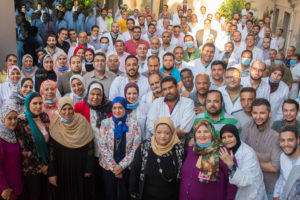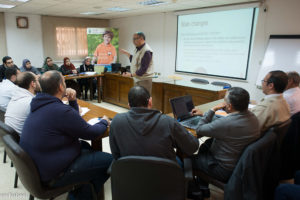Services and activities of the laboratory
Objectives & Activities
- Egyptian Consumer Protection
The laboratory is implementing investigation programs of ratios of chemical and biological pollutants in agricultural crops in domestic markets. The objective is to protect Egyptian citizen’s health from contaminated food by reducing contamination in food crops and prevent environmental degradation resulting from heavy and unconscious use of pesticides. It also aims at controlling imports and prohibiting handling of products that are violating Egyptian or international standards. Moreover, it gives confidence to consumers at large in hygiene, food and agricultural products safety in Egypt. Such objectives are reached through the implementation of various analyses of pesticide residues and pollutants in food and environment and through the issuance of ISO 17025:2017 certification for these analyses.
Results of Investigation Programs used to:
– Evaluate the extent of conformity of pesticide residues or other pollutants in food to the maximum acceptable limits
– Identify and define types of contaminated agricultural products
– Analyze and evaluate the results obtained from such programs and prepare technical reports to be submitted to the decision-makers and authorities responsible of registration of pesticides in the Egyptian Market
-Evaluate risks arising from pollutants in agricultural products whether residues of pesticides, heavy metals or other food pollutants. These studies are based on the results of periodic investigation programs as well as the experience and data gathered by the lab team.
- Control and Encouragement of Safety of Agricultural Exports
The laboratory plays a major and effective role in the increase of Egyptian agricultural exports, the improvement of their competitiveness and in their conformity to quality and safety standards. Such standards are imposed on the export market according to agreements of free trade and neighboring policies with the European Union. The lab proceeds by issuing accredited certificates to highly precise analyses carried out prior to export in order to ensure conformity to international standards and solve export problems related to pollutants in these products.
- Control of Agricultural Imports
The laboratory controls imports of agricultural crops, food of vegetal and animal origins. It does not authorize products that violate Egyptian and international standards. It also works on protecting Egyptian consumers from contaminated food imports. All such activities are implemented in cooperation with different authorities such as agricultural and veterinary quarantine, export and import control authorities, among others.
- Research activities
Participation in research projects with research authorities, institutions and universities in Egypt and all over the world
– Constant updating and introduction of new and modern technologies useful in the development of analytical methodologies in order to keep up with emerging global standards of quality and food safety
– Assessment studies over risks resulting from chemical and microbial pollutants in food and the environment
– Studies aiming at the evaluation of daily intake of various pollutants in food
– Collaboration with different research institutions in different sectors, such as ministries, universities and research centers – organic agriculture – international inspection offices on agricultural products – export and import companies of food products – consumers and farmers.
- Training activities
The laboratory conducts training programs on all food safety activities for professionals and specialists working either in the Arab Republic of Egypt or in Arab and African countries.
The laboratory has developed training programs on sampling and analysis methodologies as well as training programs on quality management in laboratories.
In collaboration import control authorities, such as agricultural and veterinary quarantines, the laboratory develops specialized training programs for inspectors focusing on sound methods for sampling based on international standards.




